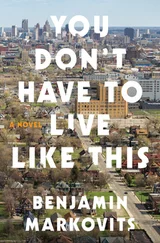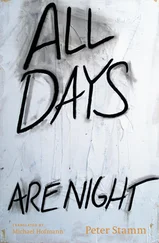He said he had intended to go to Brittany to stay with Jean-Marc.
“Don’t worry,” said Delphine, but then she didn’t say anything else.
Andreas was less tired than he’d been the day before. They took the Metro down to the Seine, and walked along the banks. The sun was shining, and there were a lot of people out enjoying themselves, with dogs and bicycles and rollerblades.
“Sometimes I think Paris is one gigantic stage set,” said Andreas.
“Have you ever tried that?” asked Delphine.
“Rollerblading? I’m too old for that. I can remember a time when skates had four wheels, like cars.”
“Did cars even exist back then? Have you got a thing about being old?”
Andreas asked her how old she was.
“When you were born, I was in the middle of puberty,” he said.
“So?”
He didn’t often think about his age, said Andreas. He had never had the feeling of being old; he thought of himself as somehow ageless. Perhaps his cough was getting to him a little bit.
On his fortieth birthday he had had a little party, largely because Jean-Marc and Marthe had forced him to. But he had never understood the fuss about those so-called round-numbered birthdays. The only thing that had bothered him then was that he wasn’t too sure whom to ask. He got on all right with most of his colleagues, but he would never have described them as friends, and he certainly didn’t feel like celebrating his birthday with them. He couldn’t invite Sylvie and Nadia together, and various other ex-girlfriends he was still in touch with weren’t really guest material either. In the end, it was a small gathering, a dinner party, not a party. And Jean-Marc and Marthe needed all their persuasive powers to make Andreas go out dancing with them afterward.
“Do you have a bad feeling about the result?” asked Delphine.
They had sat down on a bench, and watched people strolling by.
“I don’t know,” said Andreas. “I try not to think about it.”
“Then let’s go and do something. Let’s see a movie.”
He didn’t feel like it, he said. He just wanted to sit here a bit and look at the people and enjoy the sunshine, like cats, or like old people. “Did you notice how many old men stand around in the city, on corners or in front of building sites? Always standing around, with frightened-looking expressions on their faces, watching their time go by.”
They walked on. Later they ate in a restaurant near the Tour Montparnasse. Delphine said she had never been up the tower. Did he feel like going up with her? Another time perhaps, said Andreas, he was tired after their walk.
“Did you know there was a rue de Départ here, and a rue d’Arrivée?”
“Of course,” said Delphine, “and in between is the Place Bienvenue.”
“That I didn’t know.”
“And I’ve only been living here for a year,” Delphine said proudly. Three days later, Andreas got a call from his doctor’s office. The assistant said the hospital had sent the results, and asked him to drop by. Andreas asked whether the results were positive. The assistant said that, even if she knew, she wasn’t allowed to tell him. He asked if he might come over right away. In half an hour, she replied. Delphine was off in Versailles again, looking at more apartments. He left her a note, saying he had gone out and would be back soon.
On the way to the doctor’s, he told himself a hundred times that the result, whatever it was, didn’t change his condition, that it was already decided whether he was healthy or sick. Even though he walked slowly, he started to sweat, and felt a little nauseous. He could hardly make it up the stairs.
The assistant told him he would have to be patient a little longer, and asked him to take a seat in the waiting room. He thought she was looking at him rather pityingly. The waiting room was bare. There were chairs along the walls, a table in the middle of the room, with a few tattered magazines on it. A woman was sitting on one of the chairs. She had a child on her lap whose face was half-covered with a purple birthmark. The child was whimpering. The woman spoke to it quietly, and promised it chocolate if it was quiet. Andreas had taken a magazine off the table, a Catholic parents’ magazine. He read an article on the advantages of breast-feeding, but without being able to concentrate on it. The assistant came out and called a name. The woman got up and took her child by the hand. It started to scream, and clung on to the chair with its other hand.
“Always the same fuss,” said the woman, with an apologetic look in Andreas’s direction.
The assistant unclasped the child’s hand, finger by finger, and together the two women dragged the screaming child out onto the corridor. Andreas stared at the wall, which had a faded Chagall poster on it, from an exhibition he had actually been to many years ago. At the time, he had liked those pictures; now he had no use for them anymore. He took a couple of deep breaths, then he got up and left the room.
The assistant was standing with her back to him in the doorway of the surgery. The mother and child were not to be seen, though the shrill screams of the child were clearly audible. Andreas crept to the exit. He left the office and shut the door after him.
He stopped for a moment at the top of the stairs. Then he heard someone coming up the stairs, and he started to panic. He felt as though no one must see him here. He climbed up a flight of stairs and waited until he heard the door open and shut downstairs.
He left the building, and walked briskly down the street. He asked himself how many people knew about his condition. It alarmed him that there was a file with his name on it, and that there were photographs of his insides, and somewhere some tissue samples that had been taken from him. Someone had made a diagnosis and come to certain decisions about him, someone he didn’t even know. He had no choice. The machinery was in motion. We’ll take a tissue sample, the doctor had said. It wasn’t a question, it wasn’t even a command. You didn’t bother issuing commands to a victim, you just got on with it. The doctor who had performed the little operation had shaken hands with him and introduced herself. He couldn’t remember her name. The nurse and the anesthetist didn’t have names, just their functions. They were as anonymous for him as he was to them.
Andreas walked on and on in a straight line. He wasn’t going anywhere, he just wanted to get out of the neighborhood. He was running away from the disease that was his life, his work, his apartment, the people he called friends or lovers. Here on the street no one recognized him, he was just a pedestrian like a thousand others, who passed him or whom he passed. Here he had no past and no future, only a fleeting present. He had to keep walking on, he mustn’t stop, mustn’t linger, then nothing could happen to him.
The sky was overcast, but it was warm. Andreas was sweating. His body felt strange to him, unresponsive. It moved somehow independently of him. Onward, ever onward. He reached the Seine, and followed it west. He saw the Eiffel Tower loom up, and left it behind. He was on the narrow Swan’s Island, approaching the little Statue of Liberty, the model for that other one that the French gave the Americans to celebrate their independence. He had often come here during his early time in Paris. When he was sad and alone. After Fabienne had left for Switzerland, and later, when a woman had finished with him, he had come here, and stood under weeping willows and watched the freighters, and surveyed the ugly office blocks on the south bank. It was one of the few parts of Paris that wasn’t beautiful, one of the few places that didn’t have that silver patina, the patina he adored when he was feeling good, but that he couldn’t stand at times like this.
Читать дальше












